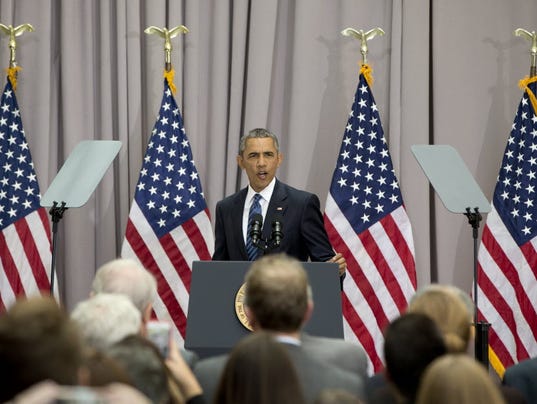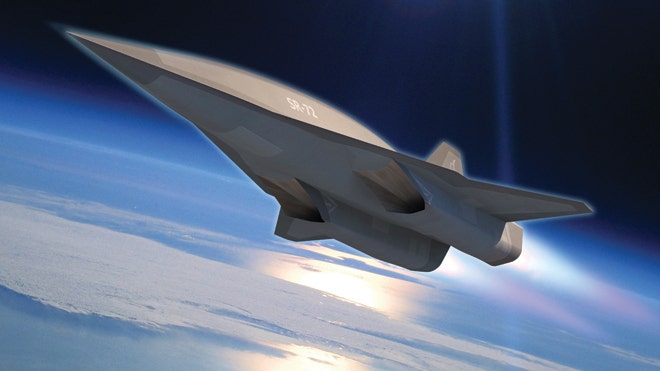
In 1983, as the U.S. confronted the threat posed by the Soviet Union, President Ronald Reagan explained America’s unique responsibility. “It is up to us in our time,” he said, “to choose, and choose wisely, between the hard but necessary task of preserving peace and freedom, and the temptation to ignore our duty and blindly hope for the best while the enemies of freedom grow stronger day by day.” It was up to us then—as it is now—because we are the exceptional nation. America has guaranteed freedom, security and peace for a larger share of humanity than any other nation in all of history. There is no other like us. There never has been.
Born of the revolutionary ideal that we are “endowed by our Creator with certain inalienable rights,” we were, first, an example to the world of freedom’s possibilities. During World War II, we became freedom’s defender, at the end of the Cold War, the world’s sole superpower. We did not seek the position. It is ours because of our ideals and our power, and the power of our ideals. As British historian Andrew Roberts has observed, “In the debate over whether America was born great, achieved greatness or had greatness thrust upon her, the only possible conclusion must be: all three.”
No other nation, international body or “community of nations” can do what we do. It isn’t just our involvement in world events that has been essential for the triumph of freedom. It is our leadership. For the better part of a century, security and freedom for millions of people around the globe have depended on America’s military, economic, political and diplomatic might. For the most part, until the administration of Barack Obama, we delivered.
Since Franklin Roosevelt proclaimed us the “Arsenal of Democracy” in 1940, Republican and Democratic presidents alike have understood the indispensable nature of American power. Presidents from Truman to Nixon, from Kennedy to Reagan, knew that America’s strength had to be safeguarded, her supremacy maintained. In the 1940s American leadership was essential to victory in World War II, and the liberation of millions from the grip of fascism. In the Cold War American leadership guaranteed the survival of freedom, the liberation of Eastern Europe and the defeat of Soviet totalitarianism. In this century it will be essential for the defeat of militant Islam.
Yet despite the explosive spread of terrorist ideology and organizations, the establishment of an Islamic State caliphate in the heart of the Middle East, the proliferation of nuclear weapons, and increasing threats from Iran, China, North Korea and Russia, President Obama has departed from this 75-year, largely bipartisan tradition of ensuring America’s pre-eminence and strength.
He has abandoned Iraq, leaving a vacuum that is being tragically and ominously filled by our enemies. He is on course to forsake Afghanistan as well.
He has made dangerous cuts to America’s military. Combined with the sequestration mandated in the Budget Control Act of 2011, these cuts have, according to former Army Chief of Staff Ray Odierno, left the Army as unready as it has been at any other time in its history. Chief of Naval Operations Jonathan Greenert has testified that “naval readiness is at its lowest point in many years.” According to Air Force Chief of Staff Mark Welsh, the current aircraft fleet is “now the smallest and oldest in the history of our service.”
For seven decades, both Republican and Democratic presidents have understood the importance of ensuring the supremacy of America’s nuclear arsenal. President Obama seems not to. He has advocated cutting our nuclear force in the naïve hope that this will persuade rogue regimes to do the same. He has imposed limits on our ability to modernize and maintain nuclear weapons. He has reduced the nation’s missile-defense capabilities.
He says that he is committed to preventing nuclear proliferation. For more than 45 years, presidents of both parties have recognized that the Nuclear Non-Proliferation Treaty is vital in this effort. Signed by 190 countries, including Iran, the NPT has been arguably the single most effective multilateral arms-control agreement in history. President Obama stands ready to gut it. Among the many dangerous deficiencies in his nuclear deal with Iran is the irreversible damage it will do to the international nonproliferation regime contained in the NPT.
Allowing the Iranians to continue to enrich uranium and agreeing to the removal of all restraints on their nuclear program in a few short years virtually guarantees that they will become a nuclear-weapons state, thus undermining the fundamental agreement at the heart of the NPT. President Obama is unraveling this international structure as part of an agreement that provides a pathway for the world’s worst state-sponsor of terror to acquire nuclear weapons.
Nearly everything the president has told us about his Iranian agreement is false. He has said it will prevent the Iranians from acquiring nuclear weapons, but it will actually facilitate and legitimize an Iranian nuclear arsenal. He has said this deal will stop nuclear proliferation, but it will actually accelerate it, as nations across the Middle East work to acquire their own weapons in response to America’s unwillingness to stop the Iranian nuclear program.
President Obama told us he would never accept a deal based on trust. Members of his administration, including his secretary of energy and deputy national-security adviser, said the nuclear deal would be verifiable with “anywhere, anytime” inspections. Instead, the Obama deal provides the Iranians with months to delay inspections and fails to address past clandestine work at military sites. Inspections at these sites are covered in secret deals, which is historic, though not in the way the president claims. Under the reported provisions of the secret deals, the Iranians get to inspect themselves for these past infractions. Inevitably these provisions will be cited by the Iranians as a precedent when they are caught cheating in the future.
The president has tried to sell this bad deal by claiming that there is no alternative, save war. In fact, this agreement makes war more, not less, likely. In addition to accelerating the spread of nuclear weapons across the Middle East, it will provide the Iranians with hundreds of billions of dollars in sanctions relief, which even the Obama administration admits likely will be used to fund terror. The deal also removes restrictions on Iran’s ballistic missile program; lifts the ban on conventional weapons sales; and lifts sanctions on Iran’s Revolutionary Guards Corps, on the Quds Force, and on Quds Force Commander Qassem Soleimani. Under Mr. Soleimani’s leadership, the Quds Force sows violence and supports terror across the Middle East and has been responsible for the deaths of American service members in Iraq and Afghanistan.
A vote for the Obama nuclear deal is not a vote for peace or security. It is a vote for an agreement that facilitates Tehran’s deadly objectives with potentially catastrophic consequences for the United States and our allies.
The Obama nuclear agreement with Iran is tragically reminiscent of British Prime Minister Neville Chamberlain’s Munich agreement in 1938. Each was negotiated from a position of weakness by a leader willing to concede nearly everything to appease an ideological dictator. Hitler got Czechoslovakia. The mullahs in Tehran get billions of dollars and a pathway to a nuclear arsenal. Munich led to World War II. The Obama agreement will lead to a nuclear-armed Iran, a nuclear-arms race in the Middle East and, more than likely, the first use of a nuclear weapon since Hiroshima and Nagasaki.
The U.S. Congress should reject this deal and reimpose the sanctions that brought Iran to the table in the first place. It is possible to prevent Iran from attaining a nuclear weapon, but only if the U.S. negotiates from a position of strength, refuses to concede fundamental points and recognizes that the use of military force will be required if diplomacy fails to convince Iran to abandon its quest for nuclear weapons.
As America faces a world of rising security threats, we must resolve to take action and shouldn’t lose hope. Just as one president has left a path of destruction in his wake, one president can rescue us. The right person in the Oval Office can restore America’s strength and alliances, defeat our enemies, and keep us safe. It won’t be easy. There is a path forward, but there are difficult decisions to be made and very little time.
We are living in what columnist Charles Krauthammer has called “a hinge point of history.” It will take a president equal to this moment to lead us through. America needs a president who recognizes that everything the nation must do requires having a U.S. military with capabilities that are second to none—on land, in the air, at sea, in space and in cyberspace. The peace and security of the world and the survival of our freedom depend on it. We must choose wisely.



 , where some of the company’s most advanced projects have been developed. It will be the successor to the famous SR-71, which the U.S. Air Force operated for decades but retired almost 20 years ago.
, where some of the company’s most advanced projects have been developed. It will be the successor to the famous SR-71, which the U.S. Air Force operated for decades but retired almost 20 years ago.


